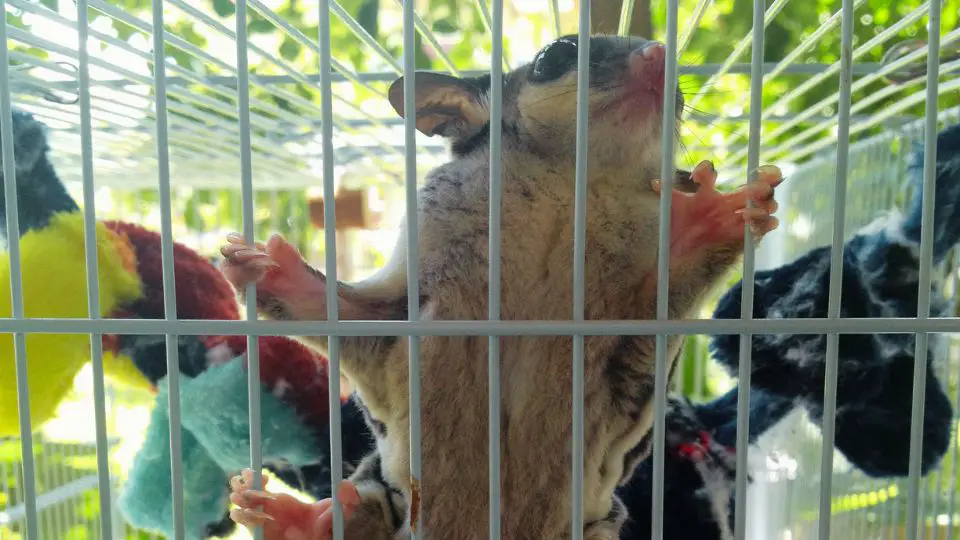Do you own a sugar glider? If so, you may have noticed that they love to bark! But why do sugar gliders bark? What are they trying to communicate with their barks?
In this post, we’ll take a closer look at the reasons behind sugar glider barking and what it means for your furry friend.
Why do sugar gliders bark?
Sugar gliders make a variety of noises to communicate with other gliders and humans. Sometimes, their vocalizations resemble barks, which is perfectly normal. But what are the reasons why sugar gliders bark?
They communicate with other sugar gliders
The primary reason sugar gliders bark is to communicate with other sugar gliders. This species is very social, so they need to be able to communicate with each other. By barking, they can let other gliders know where they are, what they’re doing, and how they’re feeling.
They warn of danger
Sugar gliders also bark to warn other gliders about possible signs of danger. If they sense a predator, for example, they will bark to let the others know. This way, the group can take action and try to escape the danger.
They express excitement or happiness
Sometimes, sugar gliders bark out of excitement or happiness. If they’re playing with another glider or human, they might let out a few barks to show how much fun they’re having.
They want attention
Another common reason sugar gliders bark is because they want attention. If they see their human and want to be petted or held, they might start barking. Or, if they’re bored and want to play, they might bark to get your attention.
They want to mark their territory
Sugar gliders sometimes bark to mark their territory. By barking, they let other gliders know that this is their space and that they should stay away. This is especially common if there’s a new sugar glider in the area.
They want to indicate they are in pain or distress
In many cases, sugar gliders’ barking is due to a physical problem. If your glider is barking excessively, you may want to see a veterinarian. If you notice other changes in his behaviour (lost appetite, lethargy, etc.) it could be a sign that your sugar glider is in pain or distress.
They are scared or stressed
Sometimes, sugar gliders bark because they are scared or stressed. If they’re in a new environment or around new people, they might start barking out of fear. This is perfectly normal and nothing to worry about. Just give them some time to adjust and they’ll likely stop barking.
Why do sugar gliders bark at night?
Sugar gliders are known for their distinctive vocalizations, which include a high-pitched “bark” that they often use at night. While the exact reason for this behaviour is still not fully understood, there are a few possible explanations.
One theory is that sugar gliders bark to communicate with other gliders. The sound can help them stay in touch with one another while they’re out foraging for food. Another possibility is that barking helps sugar gliders ward off predators. The loud noise may startle potential predators and give the sugar gliders time to escape.
Finally, it’s also possible that sugar gliders simply enjoy making the noise! Whatever the reason, it’s clear that barking plays an important role in the life of these unique animals.
Sugar gliders are nocturnal animals, meaning that they are more active during the night. In time, your sugar glider will adjust to your sleep schedule and you’ll likely hear less barking at night.
Is it normal for sugar gliders to bark?
Yes, it is normal for sugar gliders to bark. Sugar gliders are small, nocturnal marsupials that are native to Australia and Indonesia. They are social animals that live in family groups, and they use barking as a way to communicate with each other. Sugar gliders bark to convey a variety of messages, including alarm, territoriality, and even excitement. While it might be surprising to hear your sugar glider bark, there’s no need to worry – it’s just their way of talking.
How to stop the barking
Although barking is normal for a sugar glider, there are a few things you can do to stop the barking.
Give your glider more toys
Make sure that your sugar glider has plenty of toys and activities to keep him occupied. A bored sugar glider is more likely to bark out of frustration.
Avoid handling
Try to avoid handling your sugar glider too much at night. Too much activity can make them more likely to bark.
Create a safe place to sleep
Make sure that your sugar glider has a cozy, comfortable nest to sleep in. A warm, safe place to sleep will help reduce stress and minimize barking.
Keeping your sugar gliders in a cage that is not next to a window is one way to reduce their barking. This is because gliders can hear people, cars, and other animals through your window. To prevent this issue, move the cage away from the window or install a separate room to provide more isolation.
Get your glider a companion
Another solution is to get another glider, preferably a companion, to keep your sweetie company. This will help reduce boredom and the urge to bark.
Make sure they have a good diet
A sugar glider’s diet is very important to their overall health and well-being. Make sure that your glider is eating a healthy diet of fresh fruits, vegetables, and proteins. A well-balanced diet will help reduce stress and minimize barking.
Are sugar gliders noisy at night?
If you’re thinking of getting a sugar glider, you might be wondering if they’re noisy at night. The answer is yes – since they’re nocturnal creatures, they tend to be more active during the night hours.
However, this noise is simply their way of communicating, especially if they’re alone. Don’t worry, you’ll get over the “fever” of being a new sugar glider owner after a few days of interacting with them. In the meantime, consider investing in a pair of earplugs to help you get through the nights!
While sugar gliders are small animals, they can make quite a bit of noise. If you’re considering getting a sugar glider, be prepared for some nighttime barking. However, this noise is simply their way of communicating, and it’s nothing to worry about. With a little patience, you’ll get used to it in no time!
Conclusion
There’s no need to worry if your sugar glider starts barking – it’s perfectly normal! Sugar gliders bark as a way to communicate with each other, and it’s nothing to be concerned about. However, if the barking is becoming a nuisance, there are a few things you can do to help minimize the noise. Give your glider more toys, avoid handling them at night, and make sure they have a good diet. You can also try getting your glider a companion to keep them company. With a little patience, you’ll get used to the noise in no time!







